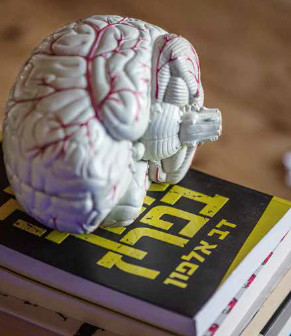Published: Monday August 21 2017A former hacker has become a neuroscientist whose research into the human brain is revealing how memory works, the meaning of dreams and the role of the subconscious in making decisions and shaping human behaviour.Professor Moran Cerf began his career in the Israeli military intelligence as a professional hacker. After four years in the army, he set up a company to use his skills commercially, working for companies and government organisations to help find vulnerabilities in their computer systems. As is common in Israel, he continued his studies while working, graduating in physics and taking a masters in the philosophy of science.When his business was acquired by a larger company, he decided to continue with his studies and consulted one of his scientific
Topics:
Perspectives Pictet considers the following as important: Cyber security, data hacking, human behavior, In Conversation With, Pictet Report, Pictet Report Summer 2017
This could be interesting, too:
Perspectives Pictet writes House View, October 2020
Perspectives Pictet writes Weekly View – Reality check
Perspectives Pictet writes Exceptional Swiss hospitality and haute cuisine
Jessica Martin writes On the ground in over 80 countries – neutral, impartial and independent
A former hacker has become a neuroscientist whose research into the human brain is revealing how memory works, the meaning of dreams and the role of the subconscious in making decisions and shaping human behaviour.
Professor Moran Cerf began his career in the Israeli military intelligence as a professional hacker. After four years in the army, he set up a company to use his skills commercially, working for companies and government organisations to help find vulnerabilities in their computer systems. As is common in Israel, he continued his studies while working, graduating in physics and taking a masters in the philosophy of science.
When his business was acquired by a larger company, he decided to continue with his studies and consulted one of his scientific heroes on the options. The elderly scientist had helped break the German Enigma code before going into science where he was involved in the discovery of DNA. His advice was to move into neuroscience, where the human brain could be seen as a black box like a computer. Today, Professor Moran Cerf is involved in ground-breaking research into the nature of memories and the unconscious part of the brain.
“He thought that my experience as a professional hacker would be ideally suited for studying the working of the human brain. Successful hacking involved the understanding of the minds of users of computer systems and I might be able to use my hacking skills to do the same for academic research into the human brain. He wrote a letter of recommendation for me, and within 18 months I was studying for a neuroscience doctorate under one of his former students at Caltech, the California Institute of Technology.”
What he had learnt from his ten years of hacking was the mentality of a hacker, which is working out how your targets think. If you can do this, it helps to identify their mistakes and the weaknesses of the systems they design and operate – whether they are the good guys being attacked or the bad guys doing the attacking. Hackers have to experiment to learn about the black boxes they are trying to break into, using psychological insights into how people think.

“Today this research on the dark side of people – cheating, lying, misbehaving – is used to help improve our understanding of the mind by testing extreme moments of conflicts within us. An example of how this works was a job that my company once did for a big phone company to test how secure their online systems were.”
”We knew that it was easier to persuade people to disclose passwords at the end of their working day when they were ready to go home. So I rang the secretary on the security desk late in the day, saying that we were working for the company on a failing antenna and had forgotten the system password. I told her the last five passwords and said she could check that there was a failing antenna where I said we were, but she still wouldn’t tell us the password.”
“Next morning, she was called by the Chief Security Officer who congratulated her on seeing off a hacker, and got her to tell him the full story for a case study – the details including the right password. In fact, we had pretended to be the CSO and that is how we got the password on the second day. We knew from our understanding of human psychology that her guard would be down: people’s defences drop with a second attack, something that real hackers will also know.”
“This is not magic – it’s how people think, and now I study what it is in the brain that makes people behave like that.” He does so at Northwestern University’s top-ranked Kellogg School of Management in Chicago, where he is Professor of Neuroscience and Business. And his pioneering research over the last 12 years has established a new way of investigating the human brain, by peeking directly inside humans’ brains.
Traditionally, neuroscience has done research on the human brain using imaging tools such as MRI or EEG, along with experiments on animals that plant electrodes in their brains. “I work with surgeons who have human brains exposed for clinical purposes. We put electrodes in their brains during surgery to monitor individual brain cells. We will ask the patients questions, show them movies and talk to them about their choices to learn how the brain works.”
“Very few people in the world get to study the human brain in this way, and we have carried out a variety of studies which have allowed us to do two things. First, we can find the cells of the brain that allow us to stimulate memories, decode them and see what patients are thinking about and imagining. Second, we can put our electrodes into the unconscious parts of their brains that people cannot access, and we can see how they make decisions before they know what they are.”

“Last year, for example, we were looking at how patients dream – they forget most them as they wake up. We have found that the residues of dreams retained on waking are very different from what they have seen in their dreams while deeply asleep. We can show the patient images of those dreams and analyse what is happening in dreaming.”
“Another study a few years ago asked people to play a game which involved pressing a button, in order to see how they decide their moves. By monitoring the unconscious part of the brain, we could see that they had decided what to do seconds before pressing a button. We can even make it possible for a patient to move a screen cursor in a particular direction by thinking about it.”
Professor Moran Cerf describes this approach as a new tool which can change behaviour. “People can be helped to stop smoking if we look at their brains when their guard is down – when they are asleep, for example – so that when they wake up, they won’t want to smoke any more. We can also help people understand when is the best time for them to make decisions, by profiling their brains: is it in the morning or the evening; or when they are hungry or full?”
A lot of this is of interest to companies, so he spends a third of each year in the business school trying to pass on the knowledge he has gained from neuroscience to people who have not been patients. This covers how to think better when engaged in business activities such as making decisions, assessing risk and planning marketing campaigns.
He has also been working with the White House to apply his knowledge on behaviour to the implementation of new policies, by understanding biases and helping fix them. And he is Alfred P. Sloan Professor at the American Film Institute, teaching an annual screenwriting class in Hollywood on science in films, helping TV studios to make science more accessible.
“My three aims as a neuroscientist are to learn more about how the brain works, to apply our findings beyond neuroscience to human behaviour, and to help people understand the consequences of our work.”
